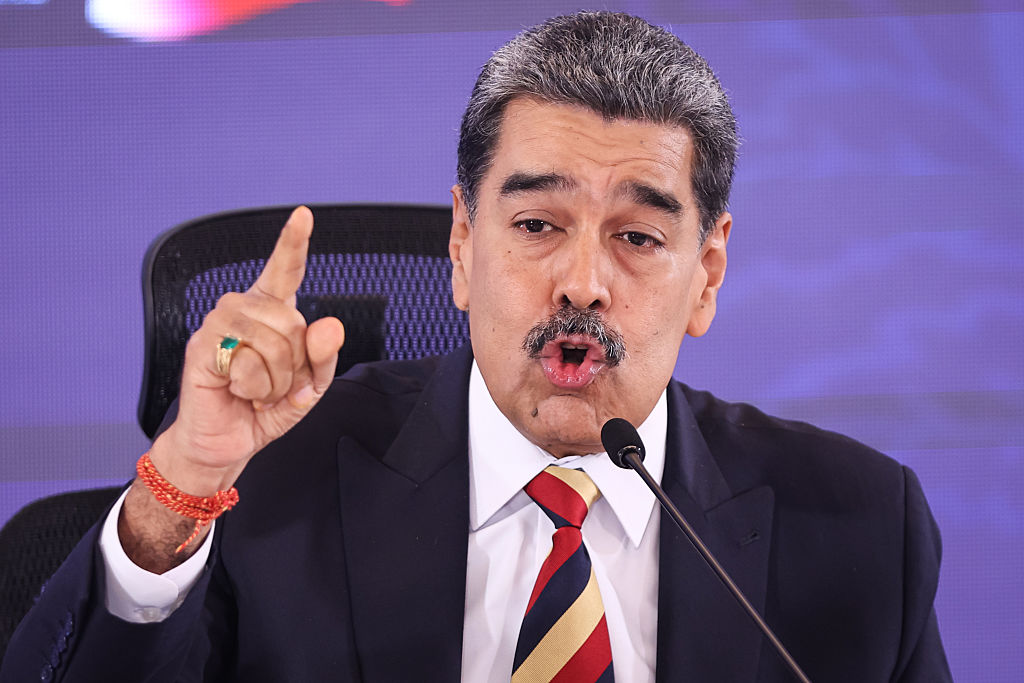President Donald Trump has denied that he is seeking regime change in Venezuela even as he has ordered a large build-up of U.S. military assets off its coast and increased threats against the country’s president, Nicolás Maduro.
[time-brightcove not-tgx=”true”]
“We’re not talking about that,” Trump told reporters Friday when asked if the U.S. was looking to oust Maduro—something that he attempted in his first term.
The Trump Administration says its military build-up in the Caribbean is aimed at stopping cartels smuggling drugs into the United States. The Pentagon took military action against what it claimed was a cartel target for the first time on Tuesday, killing 11 people in a boat it said had departed from Venezuela and was carrying drugs to the United States.
But Trump officials have increasingly accused Maduro of being in league with the cartels, raising fears that he may also be a target of the current campaign.
U.S. Defense Secretary Pete Hegseth called Maduro “effectively a kingpin of a drug narco state” following the strike on the alleged cartel boat and said the Venezuelan leader “should be worried.”
Read more: Pentagon Promises More Strikes Against Cartels After Deadly Boat Raid. What You Need to Know
“The Maduro regime is not the legitimate government of Venezuela. It is a narco-terror cartel,” Press Secretary Karoline Leavitt told reporters in August when asked about the buildup of troops in the region. “[Trump] is prepared to use every element of American power to stop drugs from flooding into our country and to bring those responsible to justice.”
Even before the build-up of U.S. military forces in the waters off Venezuela, the Trump Administration was piling pressure on Maduro.
Attorney General Pam Bondi was already offering a reward of $50 million for information leading to Maduro’s arrest and seized up to $700 million of assets allegedly linked to him on Aug. 13, including luxury goods, bank accounts, and private jets. The U.S. government does not recognize the legitimacy of his last two election victories, and Trump again on Friday called Maduro’s victory in January “a very strange election to put it mild.”
In February, Trump designated Venezuela’s Tren de Aragua gang as a foreign terrorist organization, and he has since accused Maduro of running the organization. Maduro denies any links to the group and points to his government’s own crackdown on Tren de Aragua in 2023 as proof of his innocence.
Since the start of the anti-cartel operation, the U.S. has deployed eight warships, one attack submarine, several surveillance planes, and thousands of American troops to the waters near Venezuela. The White House also said Friday that 10 F-35 fighter jets are being sent to Puerto Rico, after Venezuelan fighter jets flew close to a U.S. warship.
Trump has warned that if these fighter jets pose a threat to U.S. troops or “put us in a dangerous position, they’ll be shot down.”
Reports from CNN also suggest that the Trump Administration is considering attacks against drug cartels within Venezuela itself.
The Venezuelan government mobilized more than four million militia troops last month in response to U.S. naval movements in the region, and Maduro this week accused the U.S. of seeking regime change in Venezuela.
“They are seeking a regime change through military threat,” he told reporters on Monday.
He has threatened that any U.S. military action would be responded to with “an armed fight,” and claims that Secretary of State Marco Rubio is trying to push Trump into a conflict
“Watch out, because Mr. Rubio wants to stain your hands with blood,” Maduro said earlier this week, addressing Trump.
During his 2024 presidential campaign, Trump promised to take down the cartels just as we took down ISIS and the ISIS caliphate,” adding: “We will show NO MERCY to the cartels.”
Experts have questioned the legality both of Trump’s designation of cartels as terror groups and the use of military action against traffickers.
Following the strike, Hegseth and Trump have been clear that military action against drug cartels, specifically those operating in Venezuela, will not end with Tuesday’s strike and could be the beginning of a larger campaign.
“We’ve got assets in the air, assets in the water, assets on ships, because this is a deadly serious mission for us, and it won’t, it won’t stop with just this strike,” Hegseth said on Fox News on Wednesday. “Anyone else trafficking in those waters who we know is a designated narco-terrorist will face the same fate.”

